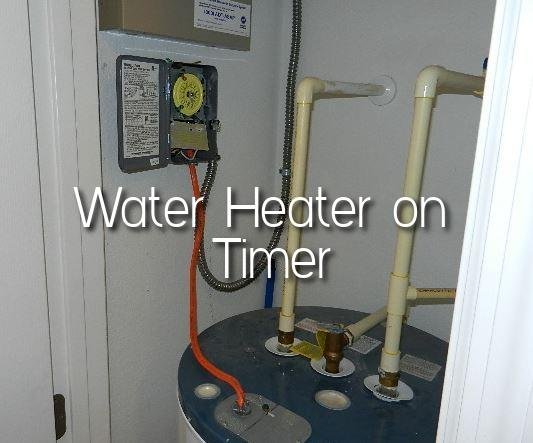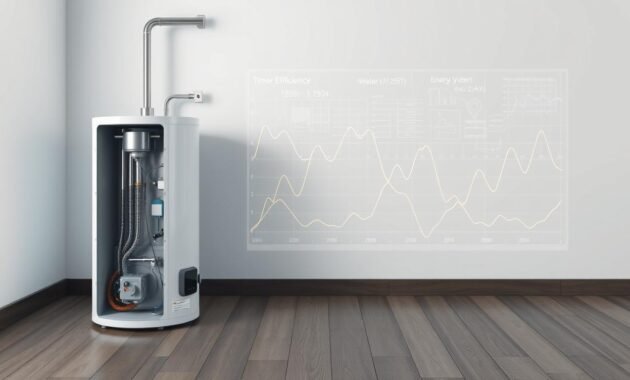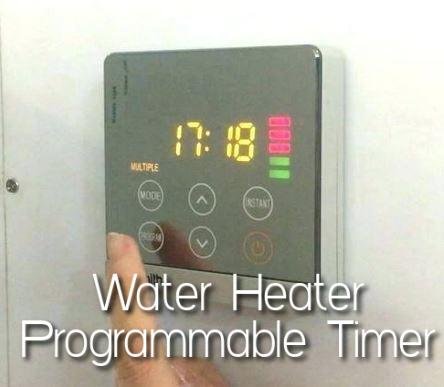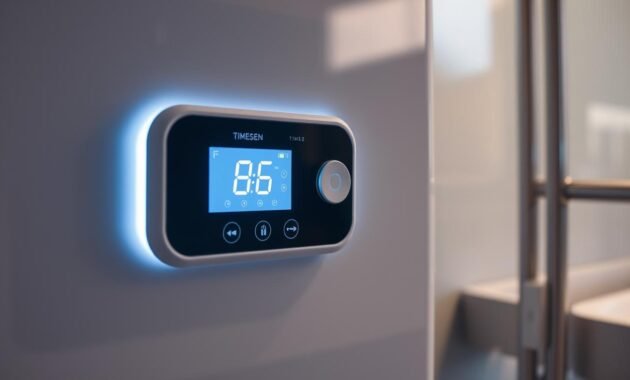Are you tired of wasting energy and money on constant hot water heating? Many homeowners struggle with inefficient water heating systems. These systems run unnecessarily, driving up utility bills and energy consumption.
The frustration of paying for hot water you don’t even use can be overwhelming. Water heater timers offer a smart solution to this common household problem.
Read also: How to Solve Hot Water Heater Knocking
By precisely controlling when your hot water heater operates, these innovative devices help you save money, reduce energy waste, and gain complete control over your home’s water heating system. I’ll guide you through everything you need to know about maximizing efficiency with a water heater on timer.

Understanding Water Heater Timers and Their Function
Water heater timers are a big help for homeowners wanting to save on energy. They control when your water heater runs, which can cut down on your utility bills. Let’s dive into the key points about water heater timers and how they boost your home’s energy use.
Read also : Water heater strap kit
Water heaters usually run for hours each day, which can raise your energy costs. With a timer, you can set when your water heater works. This cuts down on energy use when it’s not needed.
Basic Components of Water Heater Timers
- Digital display panel
- Programmable scheduling buttons
- Manual override switch
- Temperature control settings
How Water Heater Timers Control Temperature
Water heater timers are amazing because they let you control temperature and timing. You can set times for your water heater to run. This way, hot water is ready when you need it, not all the time.
Read also: The Water Heater Settings – Hot, A, B, C, Very Hot Knob
| Timer Feature | Energy Saving |
|---|---|
| Scheduled Operation | Up to 15% energy reduction |
| Temperature Limitation | 10-12% cost savings |
| Overnight Shutdown | Up to 20% energy savings |
Types of Compatible Water Heaters
Not every water heater works with timers. Electric and gas tank-style water heaters usually do best. Tankless water heaters might need special timers or smart home setups.
Timers help save money by cutting down on heating cycles. It’s smart to talk to a pro to find the right timer for your water heater and home.
Benefits of Installing a Water Heater On Timer
Installing a water heater timer is a smart move to cut down on energy costs. These devices help manage hot water use, which is key during peak hours when prices are higher.
Here are the main benefits of using a water heater timer:
- Reduce energy consumption by up to 15% annually
- Cut utility bills by targeting peak hours rates
- Ensure hot water is available exactly when you need it for washing dishes
- Minimize standby energy waste
Most families can save a lot of money. By setting your water heater to run during off-peak hours, you save money and help the planet. I’ve seen people save about $300 a year with these devices.
The timer lets you schedule hot water use. This means no extra energy when you’re not home. It’s great for morning showers or evening dishes. You get to control when you use hot water.
Pro tip: Choose a timer that fits your family’s schedule. This way, you save energy and stay comfortable.
Installation Process and Requirements
Installing a water heater timer is easy for homeowners with basic skills. It works for both older models and gas water heaters. With the right prep and approach, the installation goes smoothly.
Before starting, know the key parts and safety tips. Your steps might change based on your water heater and timer type.
Tools and Materials Needed
- Adjustable wrench
- Wire strippers
- Electrical tape
- Voltage tester
- Screwdriver set
- Electrical timer switch
- Wire nuts
Step-by-Step Installation Guide
- Turn off power at the circuit breaker
- Verify no electrical current using a voltage tester
- Remove the existing electrical connection from your gas water heater
- Mount the timer switch near the water heater
- Connect the timer switch to the main power line
- Reconnect the water heater to the timer switch
- Secure all wire connections with wire nuts
- Wrap connections with electrical tape
- Restore power and test the timer
Safety Considerations During Installation
Always put safety first when working with older models or gas water heaters. If you’re not sure about electrical work, get a pro. Wrong installation can cause electrical dangers or harm your water heater.
Always read the instructions for your water heater and timer switch. Each model has its own needs and steps.
Energy Consumption Patterns of Timed Water Heaters

Knowing how much energy your water heater uses is key. By setting a timer, you can cut down on waste and make your home more efficient.
A family of four can save a lot by using smart timers. For example, turn on the water heater 30 minutes before you need hot water. This way, you get hot water when you need it without wasting energy.
- Peak hot water demand typically occurs between 5-10 pm
- Timed water heaters reduce standby energy losses
- Programmable settings allow precise temperature control
Here are some examples of how timed water heaters can save energy:
| Usage Scenario | Energy Consumption | Cost Savings |
|---|---|---|
| Traditional Water Heater | Continuous heating | No significant savings |
| Timed Water Heater | Targeted heating | Up to 15% reduction |
Using a water heater on timer can help your household save energy. It’s all about knowing when you need hot water and setting the timer right. Try different settings to find what works best for your home.
Cost Analysis and Possible Savings
Thinking about programmable timers for your water heater? It’s important to know the cost. Scheduling your water heater can save you a lot of money over time.
Let’s look at the money side of water heater timers. The first cost might seem high, but the long-term gains are worth it.

Initial Investment Considerations
Timers for water heaters cost between $50 and $200, based on the model and features. Adding professional installation can cost another $100 to $300.
- Basic timer models: $50-$100
- Advanced smart timers: $150-$200
- Professional installation: $100-$300
Monthly Utility Bill Impact
A standard water heater uses about 4,000 watts of energy. Using a timer can cut down on energy use a lot.
| Energy Usage Scenario | Monthly Cost | Annual Savings |
|---|---|---|
| Standard Water Heater | $20-$25 | $0 |
| Timed Water Heater | $10-$15 | $120-$180 |
Long-term Financial Benefits
Programmable timers offer big savings over time. By only running the water heater when needed, you can save hundreds a year.
- Reduce energy waste during inactive hours
- Lower monthly utility bills
- Extend water heater lifespan
- Minimize unnecessary energy consumption
Many homeowners pay back their timer investment in 1-2 years. The savings keep coming, making timers a wise financial choice.
Optimal Timer Settings for Different Household Sizes
Creating the best automatic temperature control for your water heater depends on your household’s needs. I’ve found that a one-size-fits-all approach doesn’t work well for saving on water heating costs.
Here are some timer settings for different household sizes:
- Single Person Household
- Morning heating cycle: 6:00 AM – 7:30 AM
- Evening heating cycle: 6:00 PM – 7:30 PM
- Total active heating time: Approximately 3 hours daily
- Couple or Small Family
- Morning heating cycle: 5:30 AM – 8:00 AM
- Evening heating cycle: 5:30 PM – 8:30 PM
- Total active heating time: Approximately 5 hours daily
- Large Family
- Morning heating cycle: 5:00 AM – 9:00 AM
- Evening heating cycle: 5:00 PM – 9:30 PM
- Total active heating time: Approximately 8 hours daily
Setting timers wisely can save energy and ensure hot water is always ready. By using automatic temperature control, you could cut your water heating costs by up to 15% each year.
Keep in mind, these are just general tips. Your lifestyle, work hours, and water use might need adjustments for the best savings at home.
Maintenance and Troubleshooting Guide
To keep your eco-friendly hot water system working well, you need to take care of it regularly. A well-maintained timed water heater saves money and avoids sudden failures. Let’s go over the key steps to keep your water heater in great shape.
Common Timer Issues to Watch For
Timed water heaters sometimes have small problems that are easy to find and fix. Here are the most common issues:
- Inaccurate timer settings
- Electrical connection problems
- Worn-out timer mechanisms
- Inconsistent heating cycles
Creating a Reliable Maintenance Schedule
Being proactive is key to keeping your eco-friendly hot water system in good shape. Here’s a checklist to follow every quarter:
- Inspect electrical connections
- Clean timer mechanism
- Check for any visible wear or damage
- Test timer accuracy
- Verify temperature settings
Professional Help: When to Make the Call
Some problems are better handled by experts. Call a water heater specialist if you see:
- Persistent timer malfunctions
- Unusual noises from the water heater
- Significant drops in water temperature
- Repeated circuit breaker trips
- Any signs of electrical damage
Regular maintenance keeps your timed water heater running efficiently and reliably. By being proactive, you’ll make your system last longer and work better for years.
Smart Integration and Modern Timer Features

Smart water heater timers have changed how we manage home energy. They bring new control and efficiency with their advanced tech.
Today’s smart water heater timers work well with home automation systems. They let homeowners set up the best water heating schedules. You can control them through your smartphone, checking and changing water temperature and heating times anytime.
- Voice assistant compatibility with Amazon Alexa and Google Home
- Smartphone app-based temperature control
- Machine learning algorithms for personalized heating schedules
- Remote monitoring and adjustment capabilities
The latest smart water heater timers use artificial intelligence. They learn your family’s water use habits. This way, they adjust heating times to save energy and keep hot water ready when you need it.
| Feature | Traditional Timer | Smart Water Heater Timer |
|---|---|---|
| Remote Control | No | Yes |
| Energy Tracking | Limited | Comprehensive |
| AI Learning | No | Yes |
Getting smart water heater timers is a big step towards a smarter, greener home. These advanced tools help cut down energy use while keeping your home comfy and convenient.
Environmental Impact and Energy Efficiency
Water heater timers are a key tool in fighting energy waste and protecting our planet. As someone who loves sustainable living, I’ve seen how these devices can greatly help. They reduce energy use and lower our carbon footprint.
Using energy-efficient heating can change how our homes affect the environment. Water heater timers help cut down energy use without losing comfort. Here are the main environmental benefits:
- Reduces overall household energy consumption by up to 15%
- Minimizes unnecessary heating during off-peak hours
- Cuts down on unnecessary electricity usage
Carbon Footprint Reduction Insights
The impact on the environment is huge. Using water heater timers smartly can greatly reduce energy waste. Studies show that if more people use them, we could see big cuts in carbon emissions.
Energy Conservation Statistics
Here are some interesting facts about saving energy:
| Metric | Annual Impact |
|---|---|
| Average Energy Savings | 300-500 kWh per household |
| Carbon Emission Reduction | 212-354 pounds of CO2 |
| Potential Nationwide Savings | 4.7 billion kWh annually |
Small steps to save energy can have a big effect on our planet. Water heater timers are an easy and effective way to help our planet’s future.
Conclusion
Exploring water heater timers has opened my eyes to their benefits. These devices are more than just gadgets; they’re smart tools for saving energy and cutting down on bills. By timing your water heating, you can see real savings and help the planet too.
Learning about hot water heater technology shows us how easy it is to make a big difference. Using a timer means more than just saving money. It’s also a step towards using less energy overall. This lets you control how much energy your home uses.
Water heating tech keeps getting better, and timers are a great way to start saving energy at home. They’re useful for anyone who wants to save money or just be more eco-friendly. A water heater timer brings many benefits that go beyond just saving money.
I think it’s time for you to improve your home’s energy use. Look at your current water heater and see if a timer is right for you. This small change could make a big difference in your energy use. Start your journey to a smarter home with water heater timers today.


